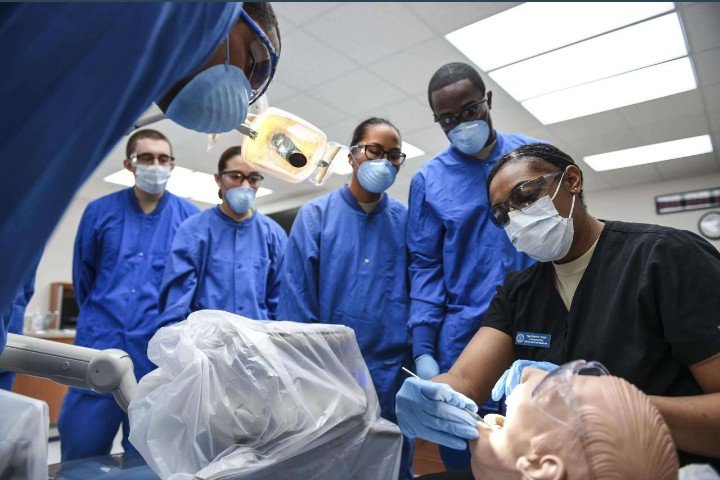 Avoid these mistakes to get your dream job in the medical field. Pixabay photo (CC0)
Avoid these mistakes to get your dream job in the medical field. Pixabay photo (CC0)
Want to secure a career in healthcare? Getting a medical job takes a lot of hard work and perseverance. Here are a few mistakes that could serve as obstacles when trying to achieve your dream career. Avoid these and you could land the medical job you’ve always wanted.
Not getting yourself work experience
The qualifications are important, but having work experience behind you can also be a huge boost on your CV, both when initially applying to a degree and when finding a job. There are lots of voluntary jobs in hospitals as well as work-shadowing opportunities, which could help you gain experience in a hospital. You could even apply for paid part-time experience as a porter. Porters must run errands for hospital staff such as collecting medication, moving machinery into an operating theater before surgery and even helping patients to get around the hospital who may have mobility issues. All of this can serve as vital experience when later applying for a job in a hospital or clinic.
Keeping your job options too narrow
Don’t let your heart get set on one specific job in the medical field. Many people aim only to be a surgeon but there may be other careers to aim for that could be more obtainable if you feel you’re struggling. For example, you could become a surgical nurse, as this guide How To Become A Surgical Nurse details. There could also be roles in radiology worth considering or even research jobs that could be better suited (surgery isn’t for everyone). It’s worth doing research into different roles – if you need to you can often specify at a later date.
Only searching for local opportunities
Local universities and clinics may not always be best suited for finding your dream job. They may be more applicants than seats to fill or may be specialized to specific area within the medical sector. Being willing to search further afield could open you up to better opportunities. When it comes to finding a course, there are online studying options now that could prevent you from having to travel. This could allow you to juggle other commitments, however you may still be bound by local job opportunities at the end of the course.
 The Air Force Dental Assistant training program provides a valuable opportunity for these students. U.S. Air Force photo/Staff Sgt. Michael Ellis.
The Air Force Dental Assistant training program provides a valuable opportunity for these students. U.S. Air Force photo/Staff Sgt. Michael Ellis.
Not asking enough questions
Throughout your course, medical school and initial training on the job, don’t hesitate to ask questions. This is your chance to learn everything you can, thus allowing you to be the best medical professional that you can be. You won’t have a chance to ask these questions once you’re on the job and this could lead to mistakes. You can’t learn everything from textbooks and the internet – especially when it comes to personal advice.
Not respecting the hierarchy
There’s a chain of command in many healthcare jobs that must be respected. Your superiors may not always be right, but they will have done a lot more training and had a lot more experience than you to get where they are. Whilst you can challenge their opinions, you should do it respectfully to avoid conflict. You don’t want to make a bad name for yourself in medical school as this could affect your outcome and prospects.
 Being an effective part of the healthcare field requires good time management skills.
Being an effective part of the healthcare field requires good time management skills.
Having poor time management skills
Healthcare staff have to be organized. They often have to juggle the care of multiple patients, which means being able to make the most out of their time. Being late on numerous cases to a shift could also lead to a disciplinary. It could be worth working on your time management if you think it’s currently an issue. It may not matter much at university where you can catch up on lectures and seminars, however when it comes to medical school and beyond you want to be good at scheduling. This post on Time-Management Strategies For Prospective Medical Students could be a useful read.
Failing to network
Like many careers, it’s not always what you know, it’s who you know. Networking with the right people might help you to find a job vacancy or a role you hadn’t considered. Look out for job fairs for medical students and conferences on medical subjects that may have people you can talk to. The likes of sites like FindNetworkingEvents are great for locating these conventions. You can also use LinkedIn to connect with medical professionals. Networking may not always directly land you the job you’re looking for, but it could help you to find work shadowing opportunities and gain other experience.
Neglecting support groups
Pursuing a medical career can be stressful. If it all becomes too much, remember that there are support groups out there. They may help you better manage your time or guide you where to look when searching for a job vacancy. Universities will always have support, as will medical schools. Even when you get to the stage of being a doctor, nurse or whatever role you decide upon, there are support groups out there such as The Doctor’s Support Network that shouldn’t be neglected.
Anonymous,


Fine piece of writing.
LikeLiked by 1 person
Thank you.
LikeLike
An indeed basic neccesity, thank you Dendy for this piece, breaking grounds on the problems we experienced.
LikeLiked by 1 person
Good writing
LikeLiked by 1 person
Support groups and Networking. These key elements can never be overemphasized, this is a nice insight into the medical field. I like the fact that the post could actually encompass other aspects of professional life. You outdid yourself on this one.
LikeLiked by 1 person